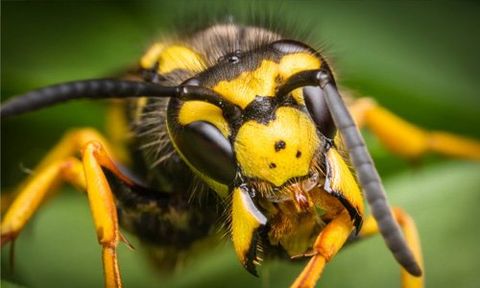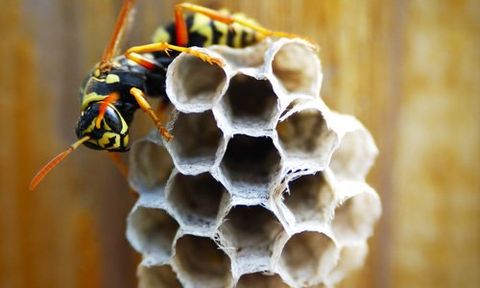023 8027 1491
Latham Pest Control
Wasps
Wasp control in Eastleigh, Southampton, Hampshire and Wiltshire
Do you want to get rid of wasps in your commercial or domestic property? Hire a professional from Latham Pest Control to get rid of wasps - fast!
Contact us
Get rid of the wasps infesting your property
Have you found a wasp's nest at your premises? Do not consider removing it on your own. At Latham Pest Control we use quality techniques to put an end to pest problems at your property. We have a team of specialists who have years of experience in wasp removal, for further information, contact us today.

How can you get rid of wasps?
Wasps generally start becoming a nuisance to people during summer when they turn their attention to sweet substances. Keeping wasps at bay can be really simple; just don’t let them access anything sweet. The various ways of making sure of that are:
- Covering dustbins with tight fitting lids
- Covering food and drinks
- Fallen fruits are cleared quickly

Latham Pest Control can help
If you need emergency advice or an urgent treatment, get in touch with our experts at Latham Pest Control. We have years of experience in getting rid of wasps from commercial and domestic properties. We also offer pest control, ant control, mice control, rat control, bed bug control, commercial contracts
and loft clearance.
What do wasps look like?
Wasps measure about 1.6 centimetres long and have a striped yellow and black body. Two species of wasp are found locally – ‘common wasps’ and ‘German wasps’. Both are known for their sting.
Wasps live in colonies that form self-contained communities, each following a caste order of queens, males and workers.
The only wasps that survive the winter are young fertilized queens they emerge from hibernation in the spring to build new nests; they build their nests to about the size of a golf ball.
To start with, the queen lays 10–20 eggs and when they hatch into larvae she feeds them until they become workers. The workers then forage for food, feed the new larvae and defend the nest.
In late summer, the colony produces males and new queens. They fly away to mate and the fertilized queens then find a place to hibernate. The cold weather eventually kills the males, workers and foundation queen.
What are wasp's nests made of?
Wasp’s nests are a work of art; the nest is constructed predominantly from paper pulp. Unlike honeybees, wasps have no wax producing glands. Many instead create a paper-like substance mainly from wood pulp. Wood fibres are collected locally from weathered wood, softened by chewing and mixing with saliva. The pulp is then used to make combs with cells for rearing.
Where do wasps build nests?
Wasps nests are normally found in holes in the ground or inside hollow trees, though they feel equally at home in sheds, wall cavities, eaves and roofs.
How do I know if I have a wasp's nest?
Unusually large numbers of wasps around your home are an indicator of a wasp nest in close vicinity. You might also notice a nest that has been constructed.
What do wasps eat?
Although wasps are fond of sweet things, they don’t have the nectar-sucking mouthparts of bees. Towards the end of the summer the workers turn their attention to sweet substances, which is why they become a nuisance to people at this time.
Wasps like fruit and nectar, insects and dustbin waste. The workers feed on liquids. All wasps feed their young on meat such as insect larvae.
How do I get rid of wasps?
Dealing with a wasp nest yourself is not recommended, so you should always contact a professional pest control company, capable of providing a reliable wasp nest removal service.
Towards the end of summer, worker wasps turn their attention to sweet substances. This is generally the time that they start to become a nuisance to people.
So keeping wasps at bay is simple, really: Just make sure they don’t have access to anything sweet. You can do this by making sure that:
- Dustbins have tight-fitting lids.
- Cover food and drink.
- Fallen fruit is cleared from your garden.
Don’t forget, the venom of the wasp contains a pheromone, which acts as an alarm. This means that when a wasp has stung something or been killed, other wasps will become more aggressive.
How can Latham Pest Control help with wasp nest removal?
If you have a wasp's nest that needs urgent treatment, or just need advice, please call us on 023 80271491 or 01962 708380 to arrange an appointment or contact us right now.
Why does a wasp sting?
A wasp uses its sting for killing prey, but it also uses it effectively for defending itself. The sting has associated glands, which produce venom, but as it’s in small amounts it doesn’t normally cause extreme harm.
Although wasps benefit the environment by controlling other small pests and clearing away dead insects, their stings are painful and can be serious if you’re allergic to them.
Unlike bees, wasps can sting repeatedly, which can be very painful. For a minority of people the venom in their sting causes anaphylactic shock, which can be fatal.
Because the venom in wasps contains a pheromone that causes other wasps to become more aggressive, it’s not advisable to swat one near its nest or other wasps.
An ordinary sting can be treated with ammonia, alcohol or cold poultices, followed by antihistamine ointment.
You must seek medical help immediately if you are stung in the mouth or neck, or if you experience dizziness, nausea, unusual swelling or extreme pain following a sting.
Get an expert to kill wasps at your property
If you are in need of professional wasp control services, get in touch with Latham Pest Control on023 8027 1491
New Paragraph
Share
Tweet
Share
Mail
FIND US
Latham Pest Control
11 Ford Avenue, Chandler's Ford, Eastleigh,
SO53 3BA
OPENING HOURS
Mon - Saturday: 8:00am - 8:00pm
Sun: Closed
© 2024. The content on this website is owned by us and our licensors. Do not copy any content (including images) without our consent.
